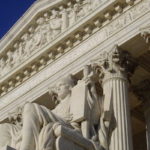Published December 12, 2012
The Supreme Court recently granted review of two lower-court decisions that were hostile to the core male-female nature of marriage. The future of marriage in this country is at stake in these cases. And so, ultimately, are the rights of faithful Catholics to participate fully in public life.
One case (United States v. Windsor) involves the federal Defense of Marriage Act. DOMA was adopted by overwhelming majorities in both houses of Congress–with votes from many supporters of homosexual rights, like then-Sen. Joe Biden–and was signed into law by President Clinton in 1996. For purposes of provisions of federal law only (such as those governing health benefits for federal employees), DOMA defines marriage as the union of a man and a woman. At the same time, and consistent with principles of federalism, DOMA leaves states free to redefine marriage as they see fit.
In 2011, the Obama administration irresponsibly abandoned its duty to defend DOMA. This past October a federal appellate court in New York issued a badly confused ruling holding that DOMA violates the Constitution by not extending federal benefits to same-sex couples who are “married” under New York law. Same-sex marriage advocates pretend that their DOMA challenge involves only the authority of the federal government. But if the federal government can’t define marriage as a male-female union for purposes of provisions of federal law, then all the similar marriage laws in the states would also be unconstitutional.
The second case (Hollingsworth v. Perry) concerns the constitutionality of California’s Proposition 8. In 2008, after the state supreme court had invented a state constitutional right to same-sex marriage, California voters adopted Proposition 8 to restore the traditional definition of marriage. Same-sex couples sued to invalidate Prop. 8, claiming that it violated the federal Constitution.
The saga of the anti-Prop. 8 lawsuit would make an unbelievable novel. No federal district judge has ever committed more egregious acts of malfeasance and manifest bias in a case than Vaughn Walker. In the end, Judge Walker concocted a federal constitutional right to same-sex marriage and based that right on a set of absurd factual findings. Only after he finished with the case and retired did he disclose that he was in the midst of a long-term same-sex relationship–which means that he had been ruling on his own legal right to marry his same-sex partner.
To compound the farce: The Ninth Circuit ruling on appeal, which also held Prop. 8 to be unconstitutional, was written by notorious liberal activist Stephen Reinhardt. Judge Reinhardt’s wife, Ramona Ripston, directed an ACLU affiliate that filed briefs in support of the Prop. 8 challengers in the same case and publicly rejoiced over Judge Walker’s ruling. Yet Judge Reinhardt somehow refused to disqualify himself from deciding the appeal. Then, in a transparent effort to evade Supreme Court review, he ruled that Prop. 8 was invalid on the narrower (but infirm) ground that it took away a right that the state supreme court had previously conferred.
The Supreme Court ought to reverse both the DOMA ruling and the Prop. 8 ruling when it decides these cases at the end of June 2013. Under any sensible interpretation, the Constitution simply does not speak, one way or the other, to the question of same-sex marriage but instead leaves the matter to the realm of representative government for decision–to each state to determine its own marriage laws and to Congress to determine what marriage means in provisions of federal law.
Alas, the fact that the constitutional questions in these cases are easy is no guarantee that the Supreme Court will get them right. Where, as with same-sex marriage, so many members of the academic, legal, and media elites hold such strong policy preferences and vituperatively disparage those who dare to disagree, some justices may well be sorely tempted to entrench the position of the elites as a newly discovered constitutional right. Plus, the Court’s previous power grabs provide precedents that could readily be manipulated to rationalize further intrusions on representative government. So there is a very real prospect that the four liberal justices and the justice in the middle, Anthony Kennedy, could vote to strike down both DOMA and Prop. 8.
Such rulings would, I believe, threaten disastrous long-term consequences.
The collapse of our marriage culture in recent decades–a collapse that heterosexuals are largely responsible for–has brought with it all the social pathologies associated with divorce, out-of-wedlock births, and single-parent families. Over the long term, the American experiment in ordered liberty cannot flourish amidst this collapse. It is time for all Americans to work to restore our marriage culture and to re-establish the inherent link between marriage and responsible procreation and child-rearing, rather than to redefine marriage to deny that vital link.
Catholic institutions and faithful Catholics are at special risk. The logic and rhetoric deployed in support of same-sex marriage depict supporters of traditional marriage as the moral equivalent of racist bigots. If a Supreme Court majority indulges that libel, those organizations and individuals who embrace the Church’s teaching will in the coming years be stigmatized, marginalized, and penalized, on matters ranging from educational admissions and employment to professional licenses, accreditations, and tax-exempt status.
All Americans should hope and pray that the Supreme Court doesn’t take a huge step in the wrong direction.
Ed Whelan is president of the Ethics and Public Policy Center in Washington, D.C., and is a regular contributor to National Review Online’s Bench Memos blog.








